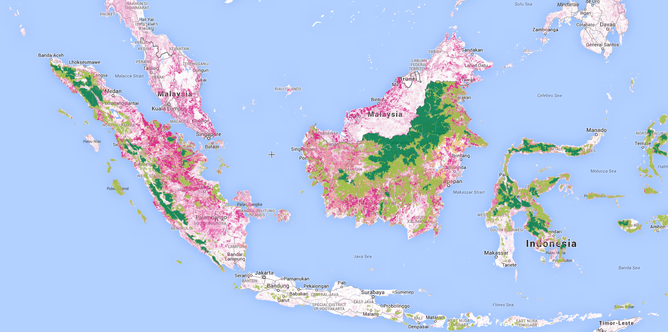Palm oil continues to destroy Indonesia’s wildlife
The Conversation: 12 November 2014: Penny van Oosterzee & Bill Laurance
If you like KitKats, you can now eat them (mostly) guilt free, mostly because this video went viral.
As a result, Nestlé in Australia no longer source oil palm from companies that clear forests, and their supply chain of oil palm is transparent.
Consumer pressure on large multinationals to source materials from suppliers who do not clear forests is working. That’s the good news.
But it’s not all good news.
Record levels of forest-clearing
In 2012, Indonesia broke the record for tropical rainforest clearing. A recent article in Nature Climate Change revealed Indonesia has cleared more than six million hectares of forest between 2000 and 2012. This is double that of Brazil’s, the previous record-holder for rainforest clearing. Brazil’s deforestation rate has fallen dramatically since 2004 while Indonesia’s rate of clearing continues to increase.
Much of Indonesia’s clearing is for agricultural commodities in particular oil palm.
Almost 40% of primary forest-loss occurred in areas that restrict or prohibit forest-clearing, such as conservation forests. Now, most of the forest loss has occurred in carbon-rich, flammable peatlands.
Despite this, Indonesia has planned to clear another 14 million hectares of native forest by 2020.
A disaster for biodiversity loss
Not only has logging, first for plywood and then for pulp and paper, paved the way for this wholesale destruction of Indonesian rainforest, but has also led to a biodiversity nightmare.
As recently as 2004, scientists thought logging was the main driver of this biodiversity loss.
But the latest data show that the worst losses of biodiversity occur, not when forests are selectively logged, but when they are converted to oil palm plantations for palm oil production.
Three-quarters of forest birds and butterflies are lost when forests are levelled for oil palm trees. Oil palm trees planted on peat swamps could cause the loss of two-thirds of the fish restricted to this habitat. According to recent research, oil palm plantations contain half the number of insects as undisturbed forest.

Forest loss in Indonesia between 2000 and 2013 (pink), intact forest (dark green) and degraded forest (light green), logged forest (yellow) and oil palm (light pink). Global Forest Watch
Global carbon stores going up in smoke
Primary forests are also the largest above-ground carbon stores globally, and peatlands the largest pools of soil carbon. On the strength of this Indonesia is the third largest emitter of carbon dioxide in the world.
The devastating forest fires of 1997/8 — the largest ever known forest fires that burned five million hectares of forest and killed one third of all orangutans — were associated with a drought year.
It’s estimated that the carbon emissions from this fire were 13-40% of annual global fossil fuel emissions of the time. All forest fires in Indonesia have been in drought years induced by El Niño and Indian Ocean Dipole events. These are associated with anomalous sea surface temperatures in the Pacific and Indian Oceans. The 1997/8 fires saw the strongest such anomalies of the twentieth century.
But something new happened last year. In 2013, for the first time known, fires started in a wetter-than-average year, following a two-month dry spell. In a year without regional climate anomalies, these fires — whose epicentre was in central Sumatra — set a new atmospheric pollution level, exceeding the 1997-98 record, over Singapore. The fires started on peatlands cleared of forest in preparation for cultivation including for oil palm.
Agricultural expansion for the consumer market accounts for up to 80% of global deforestation. Put simply, the reason we are losing our forests is because of the things we buy in supermarkets.
And nothing perhaps embodies deforestation more than oil palm.
Worth more dead than alive
ABC’s The Checkout shows the diversity of products that contain palm oil, and the confusing labelling associated with trying to buy sustainable palm oil. A recent Union of Concerned Scientists scorecard showed a global scorecard for companies moving to sustainable palm oil.
In Australia, according to Zoos Victoria, two businesses — Robern Menz and Thomas Chipman — have moved to 100% sustainable palm oil while Ferrero and Arnotts say they will move to sustainable palm oil by the end of the year.
Unilever, Nestlé, Cadbury, Kellogg’s, Mars, Coles and Woolworths plan a slower transition. After a concerted campaign by Greenpeace Proctor and Gamble have also declared a no-deforestation commitment in its supply chain.
None of this, however, has reduced the monetary value of logging and clearing Indonesia’s rainforests. Between 2000 and 2010 the prices for logs, pulp and palm oil have increased by up to 333%.
Logging lowland forests in Sabah (northern Borneo) can return profits of US$9000-13,000 per hectare. After lands have been logged and converted to palm oil they can fetch an additional US$4000-11,000 per hectare.
It would take a carbon price, say, of nearly AUD$50 per tonne of CO2 to match these prices. Worth more dead than alive, these opportunity costs are an almost insurmountable barrier to purchasing the land for conservation.
So in the mean time the battle-line for the orang-utans and their forests is the due diligence of a global army of consumers, working everyday and everywhere at the cash register.





